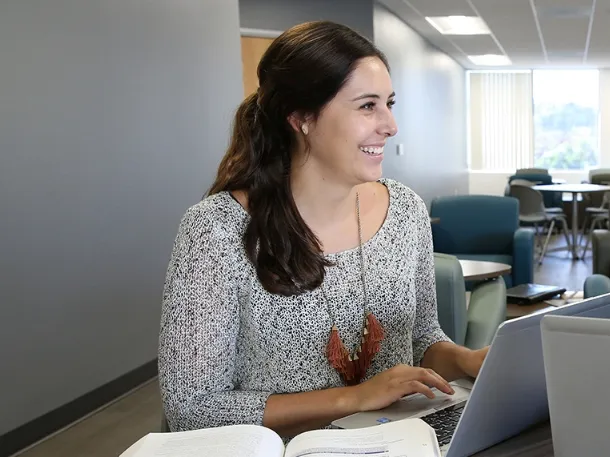- Home
- >
- APU Articles
- >
- News Article
How to Prepare for Academic Advising Appointments
November 23, 2020 | Written By Ashley Eneriz

At schools like Azusa Pacific University, academic advising is available year-round to help students stay on course to earn their degrees. Faculty advisors and academic advisors in the Academic Success Center can provide students with the resources they need to thrive.
“It’s incredibly valuable for students to track with their advisor for their own sense of calm and confidence around their graduation goals and program requirements,” said Jennifer Buck, PhD, director of APU’s interdisciplinary studies program and an assistant professor in the School of Theology. “Advisors serve as that lens to make sure nothing gets overlooked and a guide to help them gauge how to not, for example, overwhelm themselves with too many challenging classes in one semester.”
If you need additional guidance in choosing your next course load, here are a few ways an advising appointment can benefit you and tips for making the experience positive and productive.
Why Should I Go to Academic Advising?
First and foremost, academic counseling is essential for every college student—both students who are excelling in their courses and those who need help balancing a tough class with a job, sport, or home life. An advisor can make sure you’re taking the right courses and have a realistic schedule, and they can connect you to campus resources.
In addition, your academic advisor can help you find programs and opportunities you might not have known about. “I love dreaming with students about possibilities they didn’t even consider: a study abroad option, adding a minor, an independent study option, etc. I’m here to be their champion and do everything I can to make their ideas a reality,” Buck said.
Advisors can even help with questions not immediately related to their department; Buck shared that advisors are a great touch point for all university-related questions. “We often know—or we know who knows—how to answer their questions and get them connected to the right person or office,” she explained.
How Often Should I Meet with My Advisor?
Ideally, you should plan to talk with your advisor once a semester. Stephanie Gala, director of academic advising in the Academic Success Center at APU, said, “Heightened advising generally occurs the month prior to registration, and some academic departments may offer specific course scheduling advising.”
She also recommended that students seek advisement as needed to support their academic journey. “If a student wants to explore and define academic, career, and life goals, and which resources to use in this exploration process, an advising appointment will help unpack these types of questions,” said Gala.
Similarly, if there’s ever a moment in the semester when you feel discouraged or overwhelmed by your course load, don’t hesitate to check in with your advisor. Academic advisors want you to reach your educational goals and can offer valuable help along the way!
What Does an Advising Meeting Look Like?
Gala noted that APU has flourished with a shared advising model. This means that new, first-, and second-year students are supported through the Academic Success Center and receive faculty mentorship through their major departments. A student’s advisor creates an individualized academic plan so that all degree requirements are met in time for graduation.
For juniors and seniors, Gala said, “Faculty advisors also provide mentorship around vocation, graduate school, and career pathways that equip students to be difference makers now and upon graduation.”
Strategies for Ensuring a Successful Meeting
Your academic advising appointment is all about you and your educational goals. So, it helps to do some prep work! To ensure you get the most out of your meeting, Gala suggested the following tips:
- Plan meetings ahead of time, so you’re ready before decisions need to be made.
- Come prepared to share your academic hopes.
- Consider bringing questions to ask your advisor.
- Review your academic requirements, plan, and advising notes from previous meetings.
- Engage and participate by explaining your personal academic goals and expectations.
- Be honest about your circumstances and what you need to succeed.
- If you don’t understand something, ask for clarity.
- Leave knowing your next steps.
It’s helpful for students to be upfront with their advisors if they have time commitments that take place outside of school, such as a job. Having an idea of which classes you want to take is also beneficial, as it can help you both agree on a course of study that’s interesting and challenging.
In the end, all academic advisors want to see you succeed. Are you ready to achieve your degree and career goals? Contact Azusa Pacific University’s Academic Success Center to learn more and set up an appointment today.